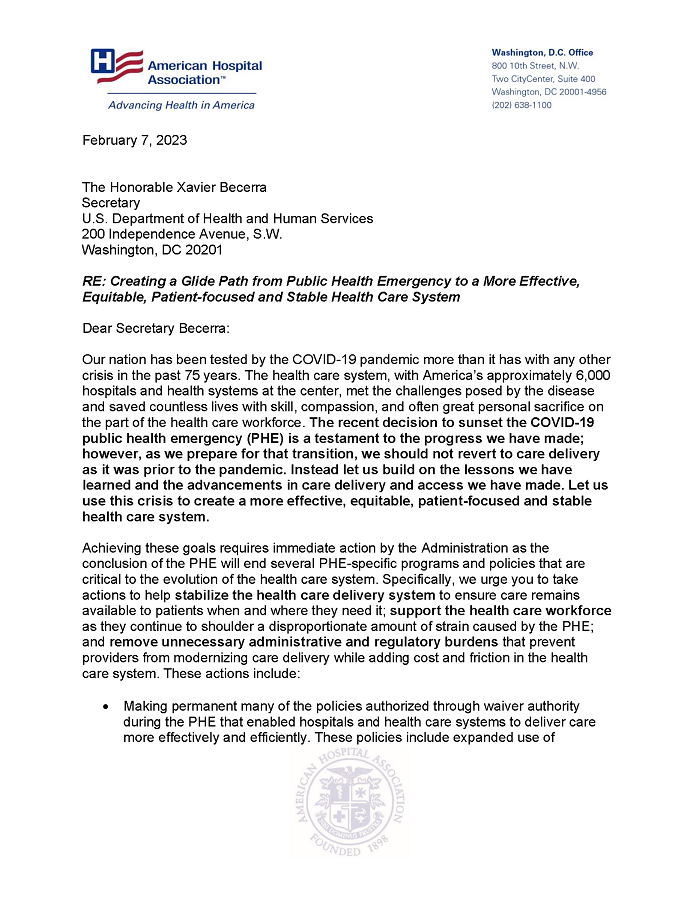

AHA Urges Action as HHS Prepares to End the COVID-19 Public Health Emergency
February 7, 2023
The Honorable Xavier Becerra
Secretary
U.S. Department of Health and Human Services
200 Independence Avenue, S.W.
Washington, DC 20201
RE: Creating a Glide Path from Public Health Emergency to a More Effective, Equitable, Patient-focused and Stable Health Care System
Dear Secretary Becerra:
Our nation has been tested by the COVID-19 pandemic more than it has with any other crisis in the past 75 years. The health care system, with America’s approximately 6,000 hospitals and health systems at the center, met the challenges posed by the disease and saved countless lives with skill, compassion, and often great personal sacrifice on the part of the health care workforce. The recent decision to sunset the COVID-19 public health emergency (PHE) is a testament to the progress we have made; however, as we prepare for that transition, we should not revert to care delivery as it was prior to the pandemic. Instead let us build on the lessons we have learned and the advancements in care delivery and access we have made. Let us use this crisis to create a more effective, equitable, patient-focused and stable health care system.
Achieving these goals requires immediate action by the Administration as the conclusion of the PHE will end several PHE-specific programs and policies that are critical to the evolution of the health care system. Specifically, we urge you to take actions to help stabilize the health care delivery system to ensure care remains available to patients when and where they need it; support the health care workforce as they continue to shoulder a disproportionate amount of strain caused by the PHE; and remove unnecessary administrative and regulatory burdens that prevent providers from modernizing care delivery while adding cost and friction in the health care system. These actions include:
- Making permanent many of the policies authorized through waiver authority during the PHE that enabled hospitals and health care systems to deliver care more effectively and efficiently. These policies include expanded use of telehealth, workforce flexibilities, and the reduction of unnecessary regulatory and data reporting requirements;
- Continuing to assist states and other stakeholders in ensuring that the Medicaid redetermination process does not leave individuals, especially children, without access to coverage and care; and
- Seizing on the lessons learned to create new processes for evaluating and revising certain hospital Conditions of Participation, as well as updating the Department’s emergency preparedness plan enabling America’s hospitals and health systems to innovate in ways that will improve the quality of and access to care while also adequately preparing them for the next national emergency.
We recognize that while the Administration has significant ability to act, there are some reforms that require congressional authorization, such as the ability to make permanent certain telehealth flexibilities and address the challenge of patient boarding in hospitals. We urge the Administration to work with Congress to advance these reforms.
We expand on each of these recommendations in the attached. We thank the Administration for its continued support and look forward to working with you to implement meaningful and necessary change. Please contact me if you have questions, or feel free to have a member of your team contact Mark Howell, AHA’s director of policy, at 202-626-2317 or mhowell@aha.org.
Sincerely,
/s/
Richard J. Pollack
President and Chief Executive Officer
Attachment A: Recommendations for Immediate Administrative Action
Attachment B: Recommendations for Congressional Action
Attachment C: Summary Chart of Recommendations


